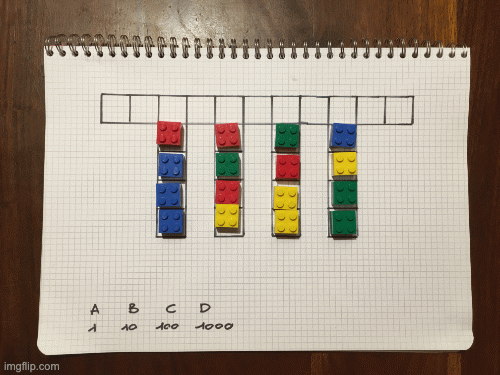Advent Of Code 2021
-
Day 1. Simple array manipulation. Using
np.convolveto implement moving window for Part 2. -
Day 2. Part 1 with list comprehension. Part 2 quick and dirty with an explicit loop.
-
Day 3.
numpyFTW, and some poor man bit manipulation (probably useless for Part 1, but I'm happy I took this road for part 2!) -
Day 4. In principle easy, if only I did not get stuck on part one because I initially forgot to check both rows and column!
-
Day 5. Part 1 simple. Part 2 was obviously introducing diagonals, implementing them required a bit of care to preserve orientation.
-
Day 6. An exponential growth, I better keep track of that population composition!
-
Day 7. I'm sure there are more efficient ways to solve this, but one-liners are always nice!
-
Day 8. Initially solved Part 2 with brute force by checking all possible wiring permutations; when i found a bit of time, implemented a smarter search exploiting segments of unique digits to dramatically reduce search space; finally, coded two procedural solutions that needs no search: first build the wiring pattern (ugly), second directly map patterns to number values (cleaner, and using python
set). -
Day 9. Recursive
floodfillalgorithm (learned in 2017 day 14!) to solve Part 2. -
Day 10. Using a
listlike a stack to store and pop open parentheses. -
Day 11. First visualisation of a grid evolution.
-
Day 12. First path-finding puzzle of the year, I was (almost) missing them! :-)
-
Day 13. Array broadcasting and
numpyfor folding and overlapping. A timid attempt to OCR the result for Part 2. -
- Part 1: simple implementation with a
list, and a more efficient one with a customLinkedList - Part 2: similarly to Day 6, better keep track of the polymer and polymer pair frequencies instead of evolving the full string, since its lenght increases exponentially!
- Part 1: simple implementation with a
-
Day 15: weighted graph shortest path, solved either with
networkxor my own implementation of the Dijkstra algorithm. -
Day 16: bit manipulation and recursion!
-
Day 17: weird physics simulation, solved with brute force.
-
Day 18: a quite complex mixture of string manipulation and recursion. It took me quite some time to implement all operations and finish part 1, after that part 2 was trivial.
-
Day 19: Tridimensional geometry treated as matrix algebra.
-
Day 20: a game-of-life on an infinite plane with a spin. Honestly I did not like today puzzle very much, the rules in the full input that "flipped" the status of all plane looked a bit like a gimmick...
-
Day 21: Part 1 trivial, Part 2 can be solved with recursion but caching with
lru_cacheis needed not to explode runtime. -
- Part 1: quick and dorty solution, that obviously cannot work for part 1 (the "large coordinated" cubes were a clear giveaway!)
- Part 2: full-fledged
Cubeclass with andifferencefunction that compute difference between cuboids and retun is a list of cuboids.
-
Day 23: Solved by hand with pen, paper and LEGO blocks, using an Excel spreasheet to keep track of movements and sum costs.
-
Day 24: Toughest day of the year, it took me many days to work out a solution. After the fact I read on the subreddit one could have simplified even more the computation by really understanding what each instruction block was doing. I am already quite happy with the approach I found (tracking the repetitive
zregister states to significantly reduce the search space, back-navigating the register state tree to build the solution), that BTW allows to find solution of Part 2 for free instantaneously. -
Day 25: simple list manipulation, but a local copy of previous state was necessary to evolve all elements simultaneously!
